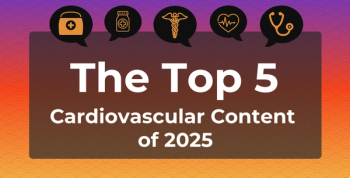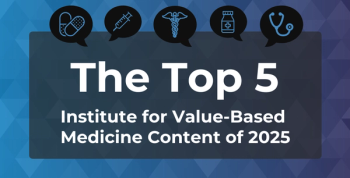
New treatments, care gaps, and cardiac monitoring were major focuses in cardiovascular news this year.

Hayden is an associate editor for The American Journal of Managed Care® (AJMC®). She joined the AJMC team in 2021, where she produces written and video content covering multiple disease states.
She has a BA in journalism & media studies from Rutgers University. You can connect with Hayden on LinkedIn.

New treatments, care gaps, and cardiac monitoring were major focuses in cardiovascular news this year.

The most-viewed content focused on the “One Big Beautiful Bill,” the Most Favored Nation drug policy, and other changes under the Trump administration.

From oncology to cardiology, Institute for Value-Based Medicine® conversations highlighted the ways value-based care is reshaping access, equity, and outcomes.

The cardiac myosin inhibitor is expected to be available in the US in the second half of January 2026.

Federal policy changes, the push for fair pricing, and growing competition in the drug pipeline were major topics at this year’s meeting.

Genetics played a major role in predicting worsening LVEF, progressing to a dilated cardiomyopathy phenotype, and a combined end point of both.

The meeting included new evidence and expert insights on hormone therapy, AI, and the expanding role of GLP-1 therapies in cardiovascular care.

Leaders describe how shared data, theranostics programs, and coordinated clinical trials support independent practices and advance value-based cancer care.

Intranasal etripamil was approved to self-treat episodes of paroxysmal supraventricular tachycardia, supported by phase 3 RAPID trial data.

Lerodalcibep-liga subcutaneous injection is now approved for adults with hypercholesterolemia, including heterozygous familial hypercholesterolemia.

Semaglutide, sotatercept, and bentracimab trials were attendees’ main focus at the American College of Cardiology 2025 Annual Scientific Session.

A review of 560 FDA-approved drugs found the FDAAA did not change overall time to first postmarket safety action, but some actions occurred earlier.

As value-based care mandates expand, a new survey highlights documentation burdens and burnout risks.

A phase 2 trial demonstrated substantial weight loss with the long-acting peptide–antibody conjugate, as well as other cardiometabolic improvements.

Patients aged 30 to 40 years with type 1 diabetes had the highest risk of sudden cardiac death, according to 2010 data from Denmark.

The guidelines highlight the need for lifelong obesity management, early diagnosis, comorbidity prevention, and patient-centered care.

Long-term data suggest stress echocardiography can uncover impaired exercise capacity and predict worse outcomes in patients.

After 8 months of treatment with mavacamten, 5% of patients developed new atrial fibrillation or flutter and 4% developed heart failure.

A case-crossover study found that extreme heat increased mortality between 10% and 18%, with higher risks in vulnerable groups.

Svetlana Barbarash, MD, outlines the lack of cardiologists and transplant services in Las Vegas and the policy changes needed to close gender gaps in care.

Onasemnogene abeparvovec-brve is now the first gene replacement therapy approved for spinal muscular atrophy in patients 2 years and older.

Svetlana Barbarash, MD, explains how better education, digital monitoring tools, and coordinated care can improve arrhythmia detection and outcomes.

Research shows a sharp rise in bisphenol-attributable metabolic disease since 2000, with annual costs exceeding $250 billion in North America.

Semaglutide and tirzepatide led to the most weight loss across 22 trials, while liraglutide remains a cost-effective alternative as its patent expires.

Updated guidelines set lower systolic blood pressure goals, expanded risk-based treatment, and call for stronger implementation to close care gaps.

Researchers urged caution in interpreting DECAF Trial results that suggest daily coffee intake is linked to a lower risk of atrial fibrillation recurrence.

The trial did not meet its primary end point for reducing plaque progression.

Combining 3 standard therapies into a single pill improved outcomes for adults with heart failure with reduced ejection fraction.

New research suggests stress cardiac MRI could help diagnose angina and improve quality of life for patients whose arteries appear clear on angiography.

Only 4% of NIH prevention projects target health disparities, revealing a major gap between equity research and real-world implementation.

Published: December 16th 2025 | Updated: December 18th 2025

Published: January 16th 2025 | Updated: January 29th 2025

Published: April 2nd 2024 | Updated:

Published: January 18th 2022 | Updated:

Published: August 5th 2022 | Updated:

Published: July 13th 2022 | Updated:

259 Prospect Plains Rd, Bldg H
Cranbury, NJ 08512
© 2025 MJH Life Sciences®
All rights reserved.
